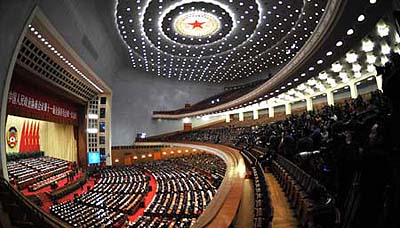| 
The First Session of the 11th National Committee of the Chinese People's Political Consultative Conference (CPPCC) started in the Great Hall of the People in Beijing on Monday afternoon.
A total of 2,195 CPPCC National Committee members coming throughout the country attended the opening meeting. They will underline major concerns of the nation's development during the annual session scheduled to conclude on March 14.
CPPCC National Committee Chairman Jia Qinglin delivered a keynote report on the work of the Standing Committee of the 10th CPPCC National Committee during the last five years after the session started at 3 p.m.
"We gave full rein to the important role of the CPPCC as a political organization and form of democracy," Jia said.
Over the past five years, the CPPCC National Committee members have listened to the government work reports and other important reports, and submitted comments and suggestions about revising the Constitution, formulating important laws and regulations such as the Anti-Secession Law.
Leading comrades of the Communist Party of China (CPC) Central Committee participated in 71 group discussions of the CPPCC National Committee members on state affairs, Jia said.
Responsible persons from the CPC Central Committee, the State Council and concerned departments listened to speeches at the sessions of the National Committee and participated in group discussions 1,300 person-times over the five years.
Jia urged political advisors to continue contributing suggestions and efforts focused on scientific development after listing a number of supervision and investigation activities the CPPCC National Committee organized over the past five years, including inspections on the Qinghai-Tibet Railway and the protection of natural grasslands in Tibet.
He also urged political advisors to join hands with Taiwan people in opposing and containing separatist activities aimed at "Taiwan independence".
Top CPC and state leaders Hu Jintao, Wu Bangguo, Wen Jiabao, Zeng Qinghong, Li Changchun, Xi Jinping, Li Keqiang, He Guoqiang and Zhou Yongkang were present at the meeting.
The CPPCC, which is an important component of China's political system, has an irreplaceable role in developing socialist democratic politics, Jia said.
The spokesman for the CPPCC session Wu Jianmin said Sunday that more eligible non-Communists are expected to become high-ranking officials in China following last year's appointments of two non-Communist ministers.
Across China, more than 31,000 non-Communists are working as officials at or above county level, of whom at least 6,000 work at government organizations and judicial bodies at various levels, according to Wu.
More than 60 percent of the 11th CPPCC National Committee members were non-CPC members, and all the 56 ethnic groups have their representatives in the top advisory body, he added.
Zhang Meiying, 10th CPPCC National Committee vice chairperson, reported to the advisors at the opening meeting on how their proposals and suggestions had been handled in the past five years.
The political consultants have raised 21,843 proposals on politics, economy, science and other issues into file, of which more than 99 percent have received response from relative departments or have been handled in line with China's laws and regulations.
Founded in 1949, the CPPCC consists of elite members of the Chinese society who are willing to serve the think tank for the government and for the country's legislative and judicial organs.
As an open forum where the ruling CPC, non-Communist parties and people without party affiliation discuss state affairs freely and on an equal footing, the CPPCC has been the manifestation of China's socialist democracy.
(Xinhua News Agency March 3, 2008) | 